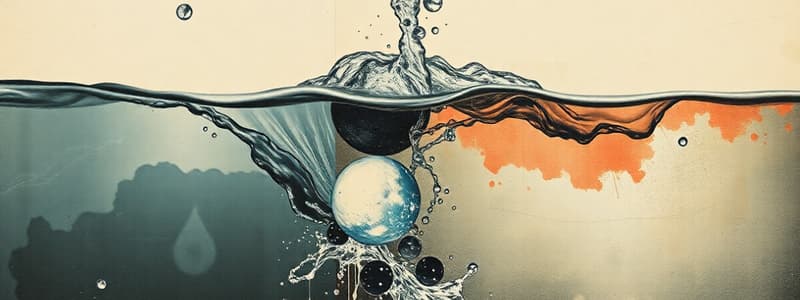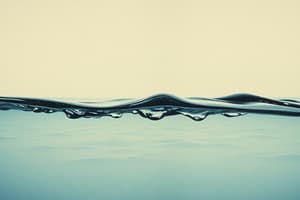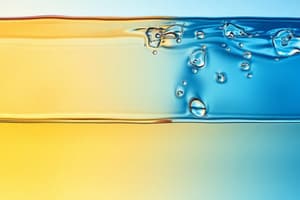Podcast
Questions and Answers
Which process occurs when ice turns into water?
Which process occurs when ice turns into water?
- Melting (correct)
- Freezing
- Condensation
- Evaporation
Water can only exist in two physical states: liquid and gas.
Water can only exist in two physical states: liquid and gas.
False (B)
What effect does increasing temperature have on the rate of evaporation?
What effect does increasing temperature have on the rate of evaporation?
It increases the rate of evaporation.
Water is called the universal __________ because it can dissolve many different substances.
Water is called the universal __________ because it can dissolve many different substances.
Match the terms with their definitions:
Match the terms with their definitions:
What does solubility refer to?
What does solubility refer to?
What is the change in state from a gas to a liquid called?
What is the change in state from a gas to a liquid called?
The solubility of a substance in water remains constant regardless of temperature changes.
The solubility of a substance in water remains constant regardless of temperature changes.
The temperature of water changes during the process of condensation.
The temperature of water changes during the process of condensation.
What factors can affect the solubility of a substance in water?
What factors can affect the solubility of a substance in water?
Different substances have different __________ in water.
Different substances have different __________ in water.
What happens to energy when water vapor condenses?
What happens to energy when water vapor condenses?
Match the following terms with their definitions:
Match the following terms with their definitions:
When ice is melting, energy is __________ from the surroundings.
When ice is melting, energy is __________ from the surroundings.
Match the following processes with their corresponding changes:
Match the following processes with their corresponding changes:
Which process in the water cycle involves water vapor cooling and forming droplets?
Which process in the water cycle involves water vapor cooling and forming droplets?
Higher humidity decreases the rate of evaporation.
Higher humidity decreases the rate of evaporation.
What is the process called that describes the continuous movement of water between liquid and vapor forms?
What is the process called that describes the continuous movement of water between liquid and vapor forms?
When water droplets in clouds become heavy enough, they fall as __________.
When water droplets in clouds become heavy enough, they fall as __________.
Match the factors influencing the rate of evaporation with their respective effects:
Match the factors influencing the rate of evaporation with their respective effects:
What is the term for the substance that is dissolved in a liquid?
What is the term for the substance that is dissolved in a liquid?
All substances can dissolve in water.
All substances can dissolve in water.
What is formed when a solute dissolves in a solvent?
What is formed when a solute dissolves in a solvent?
When the water is ____, the rate of dissolving is higher.
When the water is ____, the rate of dissolving is higher.
What is the temperature at which ice melts?
What is the temperature at which ice melts?
Water vapor is visible to the naked eye.
Water vapor is visible to the naked eye.
What happens to water at 100°C?
What happens to water at 100°C?
Match the change in state with its description:
Match the change in state with its description:
A saturated solution contains no undissolved solute.
A saturated solution contains no undissolved solute.
How does temperature affect the solubility of most substances in water?
How does temperature affect the solubility of most substances in water?
A solution is considered saturated when it can no longer dissolve any more ______.
A solution is considered saturated when it can no longer dissolve any more ______.
Match the following substances with their solubility characteristics:
Match the following substances with their solubility characteristics:
Flashcards
Evaporation
Evaporation
The process where liquid water changes into water vapor (gas) at any temperature.
Condensation
Condensation
The process where water vapor (gas) in the air cools and changes back into liquid water, forming clouds.
Water Cycle
Water Cycle
The continuous movement of water on, above and below the surface of the Earth.
Solute
Solute
Signup and view all the flashcards
Solvent
Solvent
Signup and view all the flashcards
Solid State of Water (Ice)
Solid State of Water (Ice)
Signup and view all the flashcards
Liquid State of Water
Liquid State of Water
Signup and view all the flashcards
Gaseous State of Water (Water Vapor)
Gaseous State of Water (Water Vapor)
Signup and view all the flashcards
Melting
Melting
Signup and view all the flashcards
Freezing
Freezing
Signup and view all the flashcards
Solubility
Solubility
Signup and view all the flashcards
Temperature's Impact on Solubility
Temperature's Impact on Solubility
Signup and view all the flashcards
Variations in Solubility
Variations in Solubility
Signup and view all the flashcards
What is condensation?
What is condensation?
Signup and view all the flashcards
Does temperature change when water changes state?
Does temperature change when water changes state?
Signup and view all the flashcards
What happens to energy during melting and boiling?
What happens to energy during melting and boiling?
Signup and view all the flashcards
What happens to energy during condensation and freezing?
What happens to energy during condensation and freezing?
Signup and view all the flashcards
What is evaporation?
What is evaporation?
Signup and view all the flashcards
Transportation
Transportation
Signup and view all the flashcards
Precipitation
Precipitation
Signup and view all the flashcards
Rate of Evaporation
Rate of Evaporation
Signup and view all the flashcards
What is a solute?
What is a solute?
Signup and view all the flashcards
What is a solvent?
What is a solvent?
Signup and view all the flashcards
What is a solution?
What is a solution?
Signup and view all the flashcards
What does soluble mean?
What does soluble mean?
Signup and view all the flashcards
What does insoluble mean?
What does insoluble mean?
Signup and view all the flashcards
Why do some substances dissolve more than others?
Why do some substances dissolve more than others?
Signup and view all the flashcards
How does temperature affect solubility?
How does temperature affect solubility?
Signup and view all the flashcards
Saturated solution
Saturated solution
Signup and view all the flashcards
What happens when we keep adding solute to a solution?
What happens when we keep adding solute to a solution?
Signup and view all the flashcards




